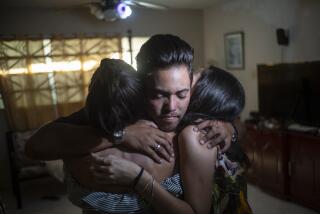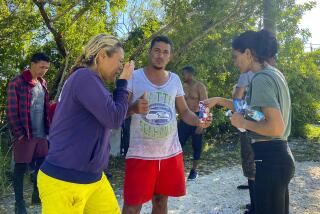DATELINE: CUBA : THE MYSTERIOUS ISLAND, THEN AND NOW
- Share via
Northeastern Shore, 1492:
On Oct. 27 Christopher Columbus (right) reached Cuba, which he described as “the most beautiful land I’ve ever seen.” His scouts discovered the peaceful Taino Indians, who had migrated to the island from the Dominican Republic about 400 years earlier. Other Indian tribes from South America are believed to have inhabited the island since 3500 BC.
Havana, 1991:
For many Americans, their first impression of Cuba is formed upon departure from Miami International Airport. Isolated, cruel, sad. These are words that come to mind.
Several hundred people wait in line at the security checkpoint to enter the lounge for charter flights to Havana, but only about one-third will board a plane.
The others have come to bid farewell, often tearfully, to friends and relatives. The Cuban government, says an expatriate named Ana, allows men over 40 and women over 35 to visit relatives in the United States for one month.
Ana has come to the airport to see off her brother. She says he wants to stay in Miami, but he will not because his wife and children are in Havana.
“That is all that is there for him,” Ana says. But it is enough to make him return, which the Cuban government knows. It prohibits families from traveling together to the United States.
The Cuban government has strict limitations on items that its people can bring back in their baggage. But the travelers generally are allowed to keep anything on their person. It is not unusual to see Cubans at the Miami airport wearing two or three hats stacked on top of each other, several layers of clothes and enough costume jewelry to stock a five-and-dime store.
Many of their purchases are cheap, but, at home in Cuba, they are luxuries.
More to Read
Sign up for The Wild
We’ll help you find the best places to hike, bike and run, as well as the perfect silent spots for meditation and yoga.
You may occasionally receive promotional content from the Los Angeles Times.






